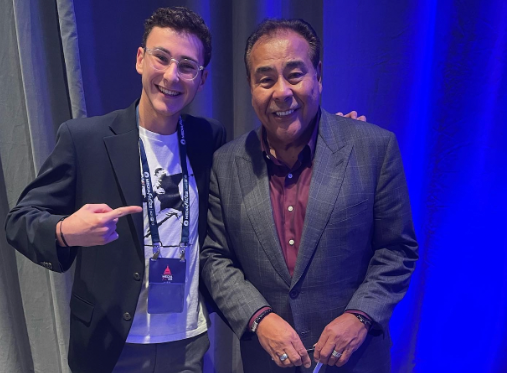
72 hours in DC for MediaFest22 was, for an aspiring journalist, an experience worth its weight in gold. MediaFest, the Society of Professional Journalists’ and College Media Association’s yearly national convention, featured speeches from 60 Minutes correspondent Bill Whitaker, host of “What Would You Do?” John Quiñones and CNN Chief International Correspondent Clarissa Ward. While listening to their speaking was powerful, more important was the self-reflection they provoked in which I could place my current amibitions, and place my future aspirations into realistic perspectives.
Listening to such distinguished speakers voice their vocational ups and downs allowed me to grasp how human their rise truly was; If they can reach the pinnacle of journalistic excellence, so can I. Over the course of three days, I made connections with POLITICO analysts, Washington Post reporters and White House Press staff — relationships that could be critical to setting a solid base for my journalistic career.
Becoming a world-renowned journalist has always been my dream, but sometimes it has felt like getting there is a different story. While I have always been passionate, the world of journalism can sometimes feel impossibly difficult to navigate. What I learned at MediaFest is that it takes decades upon decades of dedication, perseverance and love of journalism for there to be a glimmer of success.
Roland Martin, a former National Association of Black Journalists “Journalist of the Year,” said “no matter what happens, be unafraid of backing down. In this world, nothing is easy, there’s always a fight, a fight for your dreams.” When I heard this quote, I realized once more that just because the journalists in front of me were succesful, at one point in their lives they were like me: young and passionate, but in need of guidance and direction.
John Quiñones discussed his rise from an impoverished childhood in San Antonio to covering network television investigative pieces on ABC News. Throughout the years of writing countless stories, Quiñones never forgot what he described as a foundational principle he carries with him to this day: “give a voice to the voiceless.” Quiñones explained that at its core, proper, grounded journalism is about reporting the truth, and nothing but the truth. He emphasized that journalists must strive to bring change to the communities which need it the most. Quiñones’ description of journalists as activists inspired me to view journalism as more than a profession, and reminded me of the crucial role that I believe I have the capacity to play.
In his speech, Bill Whitaker described a journalist’s need for perseverance, stating: “as journalists, we have to keep on keeping on. Keep shining a light in the shadows. Truth and facts are the swords and the shields that make us shine.” I plan on keeping his words close to my heart. The privilege of listening to a legend like Whitacker awed me. His humanity helped me realize that although the journey may not be easy, I can make it in this industry. As a young journalist, I want to use my position to catalyze a greater social good, and I long for the journalistic passion I hold deep down to remain unchanged.
Whether in a casual or professional setting, MediaFest22 has taught me how valuable learning from more experienced professionals can be. Forging ties with fellow collegiate journalists nationwide and lending an ear to individuals who were in my very position decades back will undeniably benefit me down the line, opening up avenues to greater possibilities.
I am excited to participate in MediaFest23 next Spring, which will take place in San Francisco.
















